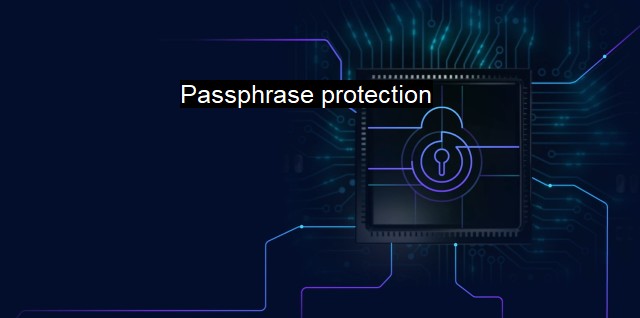What is Passphrase protection?
Passphrase Protection: A Vital Tool for Cybersecurity in the Digital World
Passphrase protection is a crucial aspect within the realm of cybersecurity and antivirus protection. The term refers to a mechanism that guards resources by only allowing access to individuals who know and correctly type in a series of words or an associated 'passphrase.' This technique is often used to secure digital platforms, systems, and applications. As distinct from regular passwords, passphrases are usually more extended, making them a valuable security tool against brute-force attacks by hackers.The inception of passphrases dates back to the early days of cybersecurity as a way of accessing restricted digital resources. While passwords have traditionally sufficed for many use cases, they have a few drawbacks, especially from a security perspective. Passwords are generally short strings of characters, which makes them susceptible to cyber-attacks through methods such as bruteforce cracking, which involves systematically attempting all possible combinations until the correct one is found. Alternatively, cybercriminals may use dictionary attacks, trying all the words in a list often consisting of actual words found in a dictionary.
Passphrase protection takes a different approach, which is integral to its efficacy in promoting cybersecurity. Instead of using a short password, passphrases are usually a string of words or sentences, thereby drastically increasing the number of possible combinations to produce a user's passphrase. As a result, they allow for significantly more permutations compared to traditional passwords, resulting in enhanced security. The sheer volume of possibilities currently offered by passphrases makes them impractical for cybercriminals to crack through traditional bruteforce or dictionary tactics.
Passphrases contain more natural language elements, making them easier to remember for the human brain, thus rendering them a more superior and user-friendly option than conventional passwords. These natural language features include incorporating correct grammar structures, including words in a sequence familiar to the user, among others. it's crucial to ensure that these language characteristics do not compromise the passphrase security nature by making it a predictable sequence, such as using discernible patterns or public knowledge details (like common idioms, movie quotes or birthdays).
On the antivirus side, passphrase protection helps secure these software and tools from unauthorized, and potentially, malicious access. By implementing this protection at various entry points (like during software setup, and while authorizing significant changes in settings), antivirus systems can effectively guard against unauthorized infiltration or tampering attempts. This implementation increases overall security for both the program in question and, above all, for the end-user's key digital assets, personal and financial data.
Passphrase best practice necessitates that an ideal passphrase should be lengthy and include various character types, such as capital and small letters. it should benefit from incorporating numbers and special characters to increase its variance and complexity.
Effective passphrase practices also encompass avoiding dictionary words or obvious choices like sporting terms, popular cultural references, or commonly used phrases. For instance, "rabbitbutterflymoon" would not be a secure passphrase, even though it has a high character count. That's because it's made up of three basic English words, which leaves it vulnerable to dictionary attacks.
Similarly, passphrases should be transformed frequently, typically every few months, to guard against any potential security leakages and the increased possibility of their eventual compromise over time.
Passphrase protection is a growing cybersecurity phenomenon predicated on utilizing longer and more complex authentication measures. It's gaining sway over conventional passwords owing to its increased resistance to standard hacking methods, levels of password entropy, and its generally favorable characteristics for simplifying user memorization processes. The role it plays in antivirus protection only accentuates its overall necessity in a digital world increasing targeted by cyber threats, further consolidating its position as a reliable guardian of our digital footprints.

Passphrase protection FAQs
What is passphrase protection in cybersecurity?
Passphrase protection is a term used in cybersecurity to describe the use of a unique phrase or sentence that is used as a password to protect important data. This phrase is usually longer than a traditional password and contains a mixture of letters, numbers, and special characters.How does passphrase protection differ from traditional passwords?
Passphrase protection is considered more secure than a traditional password because it is longer and more complex. It is also easier to remember since it can be a sentence or phrase that has personal meaning to the user.Can passphrase protection be used to protect antivirus software?
Yes, passphrase protection can be used to protect antivirus software. Many antivirus programs allow users to set a passphrase that is required to access the settings or make changes to the software. This prevents unauthorized access and keeps the software more secure.What are some best practices for creating a strong passphrase?
When creating a passphrase, it is important to use a random combination of words, numbers, and special characters. Avoid using common words or phrases, and do not use personal information that could be easily guessed. It is also recommended to use a passphrase that is at least 12 characters long. Finally, consider using a passphrase manager to securely store and manage your passphrases.| | A | | | B | | | C | | | D | | | E | | | F | | | G | | | H | | | I | | | J | | | K | | | L | | | M | |
| | N | | | O | | | P | | | Q | | | R | | | S | | | T | | | U | | | V | | | W | | | X | | | Y | | | Z | |
| | 1 | | | 2 | | | 3 | | | 4 | | | 7 | | | 8 | | |||||||